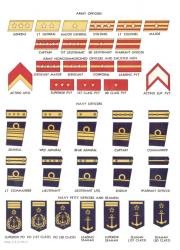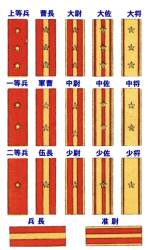The Rise of the Militarists
The Korean Peninsula was the starting point for Japanese expansion. As early as the 1880s, Japan's leaders had concluded that Koreawas a "dagger at the heart of Japan," and no other country could be allowed to control the peninsula. It was over Korea that Japan became involved in war with the Chinese Empire in 1894-95 and with Russia in 1904-05. The war with China established Japan's domination of Korea, while also giving it the Pescadores Islands and Formosa (now Taiwan). After Japan defeated Russia in 1905, the resulting Treaty of Portsmouth awarded Japan certain rights in Manchuria and in southern Sakhalin, which Russia had received in 1875 in exchange for the Kurile Islands. Both wars gave Japan a free hand in Korea, which it formally annexed in 1910.
World War I permitted Japan, which fought on the side of the victorious Allies, to expand its influence in Asia and its territorial holdings in the Pacific. The postwar era brought Japan unprecedented prosperity. Japan went to the peace conference at Versailles in 1919 as one of the great military and industrial powers of the world and received official recognition as one of the "Big Five" of the new international order. It joined the League of Nations and received a mandate over Pacific islands north of the Equator formerly held by Germany.
During the 1920s, Japan progressed toward a democratic system of government. However, parliamentary government was not rooted deeply enough to withstand the economic and political pressures of the 1930s, during which military leaders became increasingly influential.
Ultra-nationalism was characteristic of right-wing politicians and conservative military men since the inception of the Meiji Restoration, contributing greatly to the prowar politics of the 1870s. Disenchanted former samurai had established patriotic societies and intelligence-gathering organizations, such as the Gen'yosha (Black Ocean Society, founded in 1881) and its later offshoot, the Kokuryukai (Black Dragon Society, or Amur River Society, founded in 1901). These groups became active in domestic and foreign politics, helped foment prowar sentiments, and supported ultranationalist causes through the end of World War II. After Japan's victories over China and Russia, the ultranationalists concentrated on domestic issues and perceived domestic threats, such as socialism and communism.
After World War I and the intellectual ferment of the period, nationalist societies became numerous but had a minority voice during the era of two-party democratic politics. Diverse and angry groups called for nationalization of all wealth above a fixed minimal amount and for armed overseas expansion. The emperor was highly revered by these groups, and when Hirohito was enthroned in 1927, initiating the Showa period (Bright Harmony, 1926-89), there were calls for a "Showa Restoration" and a revival of Shinto. Emperor-centered neo-Shintoism, or State Shinto, which had long been developing, came to fruition in the 1930s and 1940s. It glorified the emperor and traditional Japanese virtues to the exclusion of Western influences, which were perceived as greedy, individualistic, bourgeois, and assertive. The ideals of the Japanese family-state and self-sacrifice in service of the nation were given a missionary interpretation and were thought by their ultranationalist proponents to be applicable to the modern world.
The 1930s were a decade of fear in Japan, characterized by the resurgence of right-wing patriotism, the weakening of democratic forces, domestic terrorist violence (including an assassination attempt on the emperor in 1932), and stepped-up military aggression abroad. A prelude to this state of affairs was Tanaka Giichi's term as prime minister from 1927 to 1929. Twice he sent troops to China to obstruct Chiang Kai-shek's unification campaign. In June 1928, adventurist officers of the Guandong Army, the Imperial Japanese Army unit stationed in Manchuria, embarked an unauthorized initiatives to protect Japanese interests, including the assassination of a former ally, Manchurian warlord Zhang Zuolin. The perpetrators hoped the Chinese would be prompted to take military action, forcing the Guandong Army to retaliate. The Japanese high command and the Chinese, however, both refused to mobilize. The incident turned out to be a striking example of unchecked terrorism. Even though press censorship kept the Japanese public from knowing about these events, they led to the downfall of Tanaka and set the stage for a similar plot, the Manchurian Incident, in 1931.
A secret society founded by army officers seeking to establish a military dictatorship -- the Sakurakai (Cherry Society, the cherry blossom being emblematic of self-sacrifice) -- plotted to attack the Diet and political party headquarters, assassinate the prime minister, and declare martial law under a "Showa Restoration" government led by the army minister. Although the army canceled its coup plans (to have been carried out in March 1931), no reprisals were taken and terrorist activity was again tacitly condoned.
The Manchurian Incident of September 1931 did not fail, and it set the stage for the eventual military takeover of the Japanese government. Guandong Army conspirators blew up a few meters of South Manchurian Railway Company track near Mukden (now Shenyang), blamed it on Chinese saboteurs, and used the event as an excuse to seize Mukden. One month later, in Tokyo, military figures plotted the October Incident, which was aimed at setting up a national socialist state. The plot failed, but again the news was suppressed and the military perpetrators were not punished. Japanese forces attacked Shanghai in January 1932 on the pretext of Chinese resistance in Manchuria. Finding stiff Chinese resistance in Shanghai, the Japanese waged a three-month undeclared war there before a truce was reached in March 1932. Several days later, Manchukuo was established. Manchukuo was a Japanese puppet state headed by the last Chinese emperor, Puyi, as chief executive and later emperor. The civilian government in Tokyo was powerless to prevent these military happenings. Instead of being condemned, the Guandong Army's actions enjoyed popular support back home. International reactions were extremely negative, however. Japan withdrew from the League of Nations, and the United States became increasingly hostile.
The Japanese system of party government finally met its demise with the May 15th Incident in 1932, when a group of junior naval officers and army cadets assassinated Prime Minister Inukai Tsuyoshi (1855-1932). Although the assassins were put on trial and sentenced to fifteen years' imprisonment, they were seen popularly as having acted out of patriotism. Inukai's successors, military men chosen by Saionji, the last surviving genro, recognized Manchukuo and generally approved the army's actions in securing Manchuria as an industrial base, an area for Japanese emigration, and a staging ground for war with the Soviet Union. Various army factions contended for power amid increasing suppression of dissent and more assassinations.
Hirota Koki succeeded Uchida Yasuya as Foreign Minister in September 1933 (Showa 8), following the signing of the Tanggu Armistice Agreement. Baron Hirota served as the Foreign Minister during the tenure of Prime Minister Saito Makoto and the following cabinet under Admiral Okada Keisuke. In this capacity he served during the Rape of Nanking and other atrocities committed during Japan's Aggression into China.
In April 1934, the "Amaha Statement" by Amou Eiji , head of the Foreign Ministry's intelligence department, became a problem. "It is natural for Japan to act independently to maintain peace and order in East Asia. If China uses other countries to exclude Japan and takes measures that go against peace in East Asia, Japan must expel it." This was what could be called the "Asian Monroe Doctrine".
In the February 26th Incident of 1936, about 1,500 troops went on a rampage of assassination against the current and former prime ministers and other cabinet members, and even Saionji and members of the imperial court. The revolt was put down by other military units, and its leaders were executed after secret trials. Despite public dismay over these events and the discredit they brought to numerous military figures, Japan's civilian leadership capitulated to the army's demands in the hope of ending domestic violence. Increases were seen in defense budgets, naval construction (Japan announced it would no longer accede to the London Naval Treaty), and patriotic indoctrination as Japan moved toward a wartime footing.
Hirota Koki became Prime Minister in March 1936, in the cabinet reorganization following the February 26 Incident, a failed military coup attempt. His time as prime minister saw increased military influence in government and the signing of the Anti-Comintern Pact with Germany and Italy.
One of Hirota's mistakes was the reinstatement of the system of military ministers being active military officers (May 1936). This rule, which limited military ministers to those still in active service, meant that the military could topple the cabinet at any time if it chose not to provide ministers. In fact, General Ugaki Kazushige , who was given the mandate to form a cabinet to succeed Hirota, was forced to abandon the idea when the Army refused to provide ministers due to opposition from staff officers such as Ishiwara Kanji . The historical "what if" that "if an Ugaki cabinet had been formed at this time, the Sino-Japanese War might have been avoided" has been repeatedly discussed ever since.
Hirota's second issue was the "Standards for National Policy" decided at a five-minister conference in August 1936, attended by Prime Minister Hirota, Foreign Minister Arita Hachiro, Army Minister Terauchi Hisaichi , Navy Minister Nagano Osami , and Finance Minister Baba Eiichi. For the first time, a southern expansion was set out as national policy, stating that "while securing the Empire's foothold in the East Asian continent, we will advance into the southern oceans."
Hirota's third mistake was the tilt toward Germany after the Hitler Cabinet was formed in January 1933. Stalin in the Soviet Union was intensifying the Communist International (Comintern) movement. It was against this backdrop that the Hirota Cabinet concluded the Anti-Comintern Pact (November 1936). Major General Oshima Hiroshi , military attaché at the Japanese Embassy in Germany, acted independently, negotiating with Ribbentrop, Nazi Germany's chief diplomat, and finalizing the agreement. This marked the beginning of the military's involvement in diplomacy. After the war, Yoshida had the Ministry of Foreign Affairs examine the "mistakes of Japanese diplomacy," and in the documents he had them submit, he pointed out that the conclusion of the Anti-Comintern Pact "brought no benefit whatsoever other than satisfying Japan's desire to escape from international isolation" (Kazuo Ogura, "Yoshida Shigeru's Self-Questioning," Fujiwara Shoten).
After Japan's surrender, Hirota was arrested as a Class A war criminal and brought before the International Military Tribunal for the Far East (IMTFE) at the Tokyo Trials after World War II. The charges against him related to his role in Japan's aggression in China and his failure to prevent war crimes during his tenure as a high-ranking official. He offered no defense during the trial and was found guilty of several counts, including conspiring to wage aggressive war. Despite being a civilian and a popular public figure (a petition for a reduced sentence garnered nearly 30,000 signatures), he was sentenced to death and executed by hanging at Sugamo Prison on December 23, 1948. He was the only civilian official to be convicted and executed for war crimes. Controversially, he was later enshrined, along with 13 other convicted defendants, at the Yasukuni Shrine.
|
NEWSLETTER
|
| Join the GlobalSecurity.org mailing list |
|
|
|



